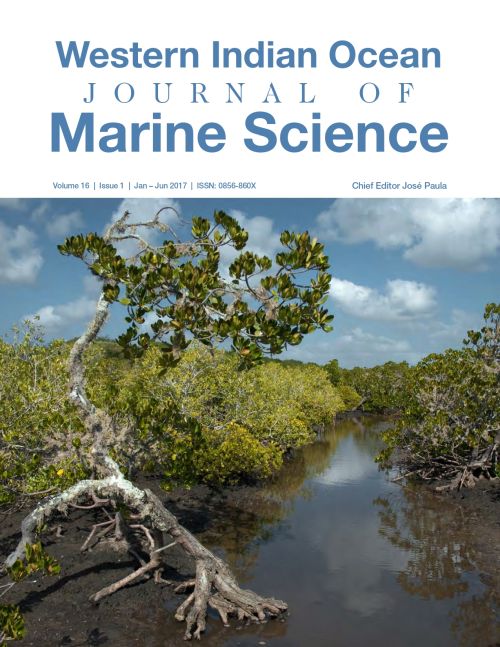Main Article Content
The food and feeding habits of the Delagoa threadfin bream, Nemipterus bipunctatus (Valenciennes, 1830), from the coastal waters around Dar es Salaam, Tanzania
Abstract
Nemipterus bipunctatus is among the Nemipterids that support artisanal fisheries throughout most of the Western Indian Ocean (WIO) region. Despite its economic importance, information on food and feeding habits is poorly known in the region. Feeding habit was examined with respect to size, sex, maturity stages of the predator, and season. The food preference for N. bipunctatus was determined using Index of Relative Importance (IRI). Crustaceans were the main prey group accounting for more than 40% IRI of the total food ingested with crabs being the most dominant prey item in the group. Fish ranked as the second prey group accounting for 32.1 % IRI of the total food consumed. Meiofauna, bivalves, miscellaneous and cephalopods made up the rest of the diet. Significantly higher mean number of major prey categories were encountered in N. bipunctatus stomachs during the southeast monsoon as compared to during the northeast monsoon (two way contingency table analysis test, χ2-test, df=3, p< 0.001). An ontogenic diet shift study revealed that meiofauna, cephalopods, and bivalves groups had higher contributions in the diet of smaller N. bipunctatus of total length (TL) 9.5-11.5 cm, to 13.6- 15.5cm; the values for this group ranged from 49.7% IRI to 0.4% IRI respectively. Fish prey contributed significantly to the diet of larger individuals of this species, ranging from 0% in small fish (9.6-11.5cm TL) to 77.0% in large fish (> 21.5cm TL). Crustaceans contributed a small proportion to the diet of this species in the upper size classes with this category almost constant in the middle and lower size classes. It was therefore concluded that the main food of N. bipunctatus is crustaceans. However, an ontogenic shift in diet occurs, with meiofauna, bivalves and cephalopods preferred by smaller size classes, and fish by larger size classes.




